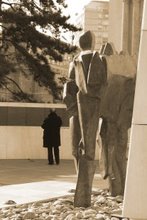As those who have known me longer surely remember, I have been harbouring this utopia for years. To be able to write a text so that it exactly tells what you intend it to tell, and so it works like superimposed layers of stories, each authentic, meaningful, fragranced, paced, and beautiful in its own right, but all working together, like an orchestra-as-text. Like the real-time counter part of a musical score composed of text, and, once opened, flowing like a rain of flowers and voices and enveloping your whole being. I am saying score, because this conveys the superpositioning, and the commingling in a certain degree of harmony, but it does not adequately survey the connectedness inherent in each voice, the relations existing between characters. It would be like a painting evolving in time, but I think it would be very unlike a movie, because the focus could change a lot better, and it would work in more emotional ways, as only words, carefully whispered, can. In any case, all metaphors fall short to describe what it is that I dream of, thereby making the point all the same. My attempts at writing,… well… let us say that the same aspiration is sustained in the intention but never even hinted at in the creation. Academic writing is a bitch, more especially so at the beginnings of PhD writing (well what else can I say? I haven’t been anywhere at the end yet… ;-)). After reading around the topic way over the boundaries, you finally resort yourself to start writing the real thing, not just notes. Stop reading, start writing, my supervisor tends to say to me when I have explored a bit too much again. You sit down and after some time, you just write.You’ve written it, and after some time it collapses into fractals. Beyond the simplest word you used in your writerly-excited flow open up ambiguities, universes in Orion’s belt and monkey symphonies that remain unaccounted and ignored. This is the period during which you become separated from the text, to see it, truly objectified, as if someone else had written it (usually translated into: ‘did I write this shit? I don’t remember any of this…’). This is difficult, because you know it will not feel the same as in-the-process-of-writing and you will become overly conscious of your huge limitations as a writer and as a person. You see how ineffectively you have caught and described the situation, how muddled your thoughts are on certain notions, and how you thoughtlessly collapsed things that were not meant to be ever confounded. You think that you may be making a lot of very little, and at the same time you are so concerned about proper representation, that you really get down to the last dot on the last i. And spend some sleepless nights in the text’s presence, pondering it. Then, tearing the whole text down, and rigging it, shaking it, fixing it, thereby creating something entirely different. By this time you may alternate burning with emotional connectedness and experiencing the most complete indifference to the text and its origins within a realer-than-real social life. You are almost tempted not to leave it lying because it might just collapse again, but you know you need to let it rest at the same time. Let it sediment. You need to work to such a different standard having to take into consideration fieldwork. Nothing like writing essays here, about books that remain stable in what their sentences have sedimented into. Ingold does not like the word ‘complexity’, but in its current usage meaning, this is exactly what it is. All social situations are so damn unstraightforward. Less so if you are going for a drink for an hour (but then again…) and more so if you want to write about them in a non-tendentious, rigorous, academically and disciplinarily valid, and, at the same time, beautiful and suggestive way. It takes a lot of time to get there, a lot of discipline and a lot of intellectual and writing work. Overwhelmingly much so (sentences like that also make the point). My problem that I cannot nail it yet, it is too twisted, and too much is trying to be there and yet fails to cohere and run like a smooth narrative should do. So this particular piece I am working on at the moment spawns comments like: you need to focus more, you need to be less ambiguous, you need to make this and that explicit, and take a lot less for granted. And yet, I know that, in the week I have until my deadline, it will not sort itself out. It will remain a thick knot of rope and pink lace and some bits of hay attached to it. It is a colourful corner of an impressionistic painting done by a mad surrealist who wanted to put her whole life into one single canvas, but then got sidetracked by the cat’s hunger pangs. And then went for a walk in the rose garden, caught the train to Moscow and discovered the snowflakes in the Red Square. Woke up two hours later back in her own bed thirsty and still sleepy. Dreamily reached out for her lover who had gone to work, felt the empty sheets, turned the radio on, got up to put the washing up, and water the flowers.





















